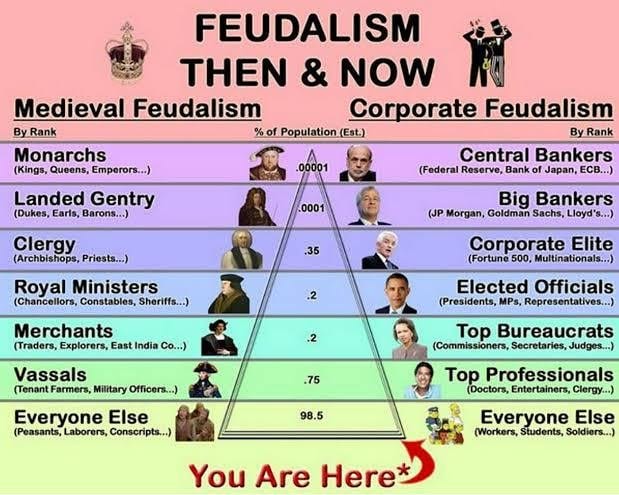Your cart is currently empty!

The Dangers of Neo-Liberalism
Neo-liberalism, a term often associated with the modern economic policies of privatization, deregulation, and state intervention, has played a significant role in shaping the global economy. However, the ramifications of these policies extend beyond mere economic outcomes. This article delves into the inherent dangers of neo-liberalism, illustrating how it serves as a precursor to a new form of feudalism—neo-feudalism—characterized by the concentration of power and wealth, erosion of individual freedoms, and the rise of a new elite class.
Concentration of Wealth and Power
One of the most alarming consequences of neo-liberalism is the concentration of wealth and power. Neo-liberal policies, which promote privatization and deregulation, often result in significant economic gains for large corporations and financial institutions. This leads to an increasing concentration of wealth in the hands of a few, creating a new elite class. According to Joel Kotkin, “today’s tech leaders increasingly resemble an exclusive ruling class, controlling a few exceptionally powerful companies, and like aristocracies everywhere they are often resistant to any dispersion of their power”.
State and Corporate Interventions
While neo-liberalism advocates for reducing state intervention in some areas, it paradoxically supports state intervention in others, such as corporate bailouts and central banking. This selective intervention perpetuates corporate dominance and creates a dependency on the state, forming a symbiotic relationship reminiscent of feudal ties. Large corporations rely on state support to maintain their status, while the state relies on these corporations for economic stability and growth.
Erosion of Individual Freedoms
As economic power becomes concentrated, individual freedoms and opportunities are increasingly compromised. Neo-liberal policies often result in reduced social mobility and greater economic inequality. People become more dependent on large corporations for employment, healthcare, and other essential services, which diminishes their autonomy. This dependency mirrors the serfdom of the feudal era, where individuals had limited freedom and were heavily reliant on their feudal lords. Kotkin notes that “many are stranded in unstable employment in the precarious gig economy—they’ve gone from Proletariat to Precariat”.
Global Financial Institutions
The influence of global financial institutions, such as the International Monetary Fund (IMF) and the World Bank, is a hallmark of neo-liberalism. These institutions enforce neo-liberal policies worldwide, leading to the standardization of economic practices that favor the elite. This global reach limits the sovereignty of individual nations, much like how feudal lords exerted control over their territories. The result is a hierarchical global society with entrenched power structures and limited social mobility.
Conclusion
Neo-liberalism, with its dual emphasis on privatization, deregulation, and selective state intervention, paves the way for neo-feudalism. The concentration of wealth and power, erosion of individual freedoms, and the pervasive influence of global financial institutions create a socio-economic system that undermines democracy and equality. It is imperative to recognize these dangers and seek alternatives that promote a more equitable and free society, lest we find ourselves in a modern-day feudal order.
Read More
For further reading on the dangers of neo-liberalism and its potential to pave the way towards neo-feudalism, these sources provide extensive insights and analyses on how contemporary economic policies may lead to socio-economic structures reminiscent of feudalism, marked by concentrated power and wealth, reduced individual freedoms, and a dominant elite class:
- Joel Kotkin’s Q&A on ‘The Coming of Neo-Feudalism’ – Newgeography.com
- Review of Joel Kotkin’s “The Coming of Neo-Feudalism” – Front Porch Republic
- The Coming of Neo-Feudalism—A Review – Quillette
- The Road to Neo-Feudalism – Joel Kotkin’s official website
- Pacific Century: Joel Kotkin On America’s Neo-Feudalism – Hoover Institution
- Neo-Liberalism: From Laissez-Faire to the Interventionist State – Mises Institute

Leave a Reply